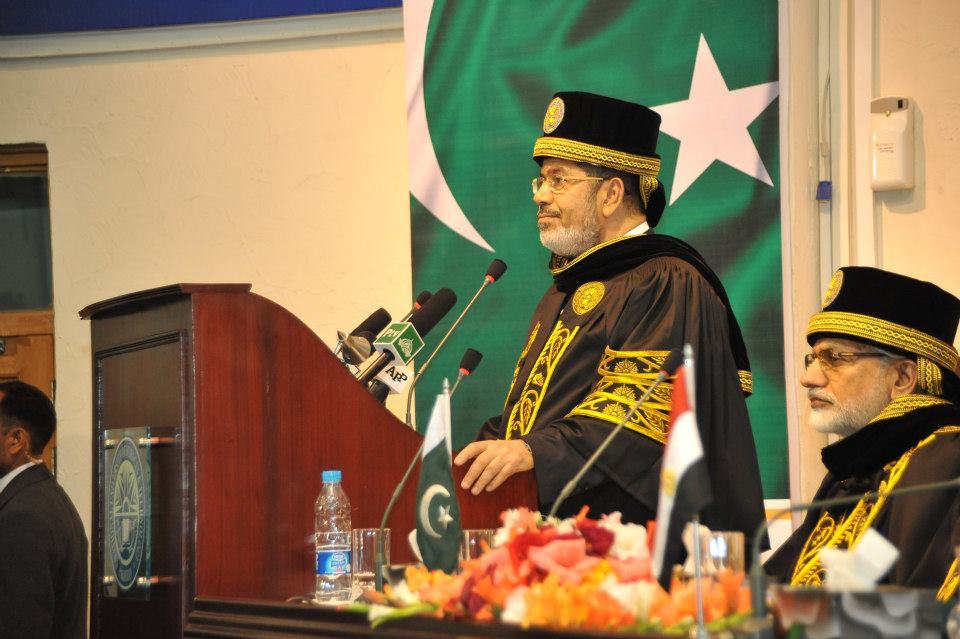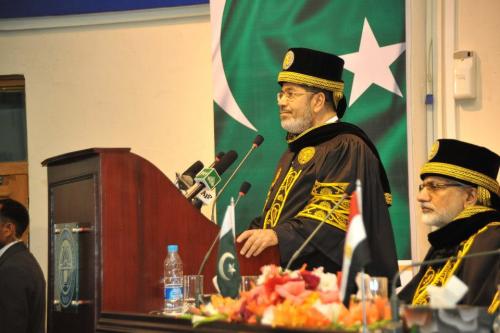
Catch up on the latest out of Egypt every week, with analysis, news updates, photos, videos, and more.
Quote of the Week
"I am hoping BRICS would one day become E-BRICS where E stands for Egypt." – Mohamed Morsi
Egypt in the News
- Public lynchings indicate ‘death of the state’: Egypt justice minister
- Shura Council to divide constituencies by number of voters
- Court delays ruling on election law
- Hamas denies involvement in Rafah massacre
- Brotherhood critics elected to Journalist Syndicate board
- Morsi begins Pakistan-India tour
- Justice Ministry drafting law to ensure president’s accountability
- Election limbo keeps Egypt’s IMF loan on ice
- Minister threatens to sue striking bakers; Bakers storm Supply Ministry again
- Egypt’s Mahalla brought to standstill by protests, strikes
- US lawmakers push to restructure Egypt aid, Erian lashes out
- Egypt sees IMF deal, first tranche by end-June – report
- Salafi leader arrested in deadly Shubra family feud
- Egypt military investigating Hamas in new case
- First Israeli FM delegation arrives in Cairo since revolution
- Morsi in India, holds talks over Syria and Palestine
- Sources say Morsi planning truce with revolutionary youth
- NSF calls for new voter lists ahead of elections
- Egypt’s justice minister Mekki will not resign: Ministry
- Muslim Brotherhood officially registered as NGO after Supreme Administrative Court body urges its dissolution
- Egypt seeks prisoner swap with Libya, say sources
- Court ruling hangs over Egypt’s Muslim Brotherhood
- Moody downgrades Egypt’s rating
- Jama’a al-Islamiya to propose vigilante committees to Shura Council
- Lynch mob kills man in Egypt’s Nile Delta
- Activists, Brotherhood youth scuffle in Moqattam, interior ministry calls for self-restraint
- EU Embassy denies rumors of cutting off Egypt aid
Egypt: Too Big to Fail? (The Foundry)
In a short piece focusing on Egypt’s flailing economy, Ryan Olson outlines the key problems:
“First, the political system has been at a standstill. Egypt has lacked an effective government since 2012, when the Supreme Court dissolved the parliament. Elections scheduled for April 2013 have again been delayed by the courts. Without a government, international lenders like the International Monetary Fund, which is offering $4.8 billion in financial support, have found it impossible to reach an agreement.
Second, Egypt’s economy has been poorly mismanaged from the beginning, particularly so under President Mohamed Morsi. Subsidies on energy drain huge sums from the state budget and reserve accounts. While ostensibly for the poor, these payments mostly benefit rich, car-owning city dwellers. Central bankers should also have moved the currency to a float sooner. By letting the pound depreciate, they could have preserved the hard currency they now find lacking.”
The remedy, according to Olson is a return to the principles of economic freedom:
“Thanks to poor rule of law and closed markets, Egypt ranks below average for the region and the world in The Heritage Foundation’s 2013 Index of Economic Freedom. Morsi claims he wants to transform the BRICs (Brazil, Russia, India, and China) into the E-BRICs, with Egypt at the head. If he can turn back to the principles of economic freedom, he could do just that.”
Egypt and Israel Two Years After Mubarak: Plus Ça Change (Tahrir Squared)
Khaled el-Guindy turns to Egypt-Israel relations two years after Mubarak’s ouster. He writes:
“Despite a general sense that things might still change for the worse, especially given Egypt’s instability and its strongly anti-Israel political culture, Israeli military officials have nothing but praise for Egyptian-Israeli security cooperation, which they say is better today than it was under Mubarak. According to Israeli analyst, Avi Issacharoff, “Whatever uncertainty Israelis may have had at the start of the transition, they now know they have a partner on the Egyptian side.” That claim was backed up by Morsi’s pivotal role in securing a Gaza ceasefire last November."
He explains the likely cause behind the lack of change in policy:
“There are several explanations for the continuity in Egypt-Israel relations, including the fact that Morsi’s civilian government is not a sole actor when it comes to Egyptian policy toward Israel/Palestine. Even after Morsi’s house-cleaning of the military’s top brass and their formal sidelining from politics last summer, the military establishment, specifically the intelligence, continues to play a central if not decisive role in matters of foreign and national security policy.
Lack of bandwidth is another factor. Egyptians are simply too consumed with their own domestic problems—including recurring political crises, increasingly violent street protests and an economy teetering dangerously close to collapse—to pursue an ambitious foreign policy agenda, particularly one that runs afoul of Washington and other Western capitals whose backing remains crucial to Egypt’s economic recovery.”
Photo of the Week
President Mohamed Morsi receives an honorary doctorate from Pakistan’s National University of Sciences and Technology:
Mosireen’s latest video, entitled "Why Riot?" attempts to explain why protests continue two years after Mubarak stepped down:
Image: Morsi%20Pakistan.jpg

